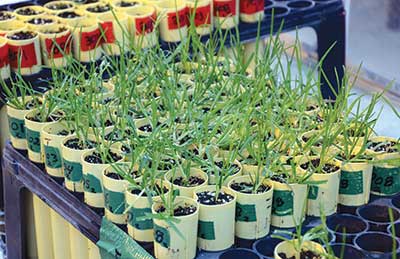Resisting the little green invaders
 What do superintendents, farmers and weekend gardeners have in common? For one, they all share a strong dislike of weeds. Whether you’re a professional or amateur, nothing can ruin your day like a weed. Worse yet, no matter how you try to control this pesky green invader it just keeps coming back for more. Fortunately, there’s help available to get weeds under control.
What do superintendents, farmers and weekend gardeners have in common? For one, they all share a strong dislike of weeds. Whether you’re a professional or amateur, nothing can ruin your day like a weed. Worse yet, no matter how you try to control this pesky green invader it just keeps coming back for more. Fortunately, there’s help available to get weeds under control.
The University of Tennessee Weed Diagnostics Center (UTWDC) is here to help identify weeds and screen them for herbicide resistance. This initiative, supported by UT AgResearch and UT Extension, provides end-users with diagnostic tests tailored to weeds in a variety of settings.
“Our aim is to provide a broad spectrum of services to both professional and consumer clientele,” says Jim Brosnan, Ph.D., associate professor of turfgrass weed science at the University of Tennessee Institute of Agriculture. “Our tests,” he says, “are tailored to weeds of crop production systems as well as turf, ornamentals and urban landscapes.”
Superintendents can submit annual bluegrass (Poa annua), crabgrass (Digitaria spp.), goosegrass (Elusine indica) and other weed species for screening for herbicide resistance. The turnaround for herbicide screening is from two weeks to five months, depending on the type of screen requested. Another service tailored to southern U.S. superintendents is bermudagrass off-type assessments.
Brosnan heads up UTWDC and sees it as a valuable service across the U.S. He says it’s important to have weeds tested to help keep them under control, and then to use the diagnostic results to implement optimal management strategies.
“All UTWDC test results are complimented with research-based control recommendations to promote proper weed management in the field,” Brosnan says. “We’ll also complement the ongoing disease and plant diagnostic efforts at UTIA’s Soil, Plant and Pest Center in Nashville.”
Employing both whole-plant and molecular methods, specialists at UTWDC provide a wide range of diagnostic services, from basic weed identification to herbicide resistance tests using DNA screening. “We’re looking to provide an all-inclusive service for our clients that’s cost-effective and helps them conserve financial and technological resources,” Brosnan says.
You can find more information about UTWDC online at weeddiagnostics.org. Follow the Center on Twitter (@WeedDiagnostics).
Jim Brosnan, Ph.D., is a turfgrass weed scientist at the University of Tennessee. You may reach him at jbrosnan@utk.edu for more information. Doug Edlund, University of Tennessee Institute of Agriculture, contributed to this summary.
Photo by: UTIA








